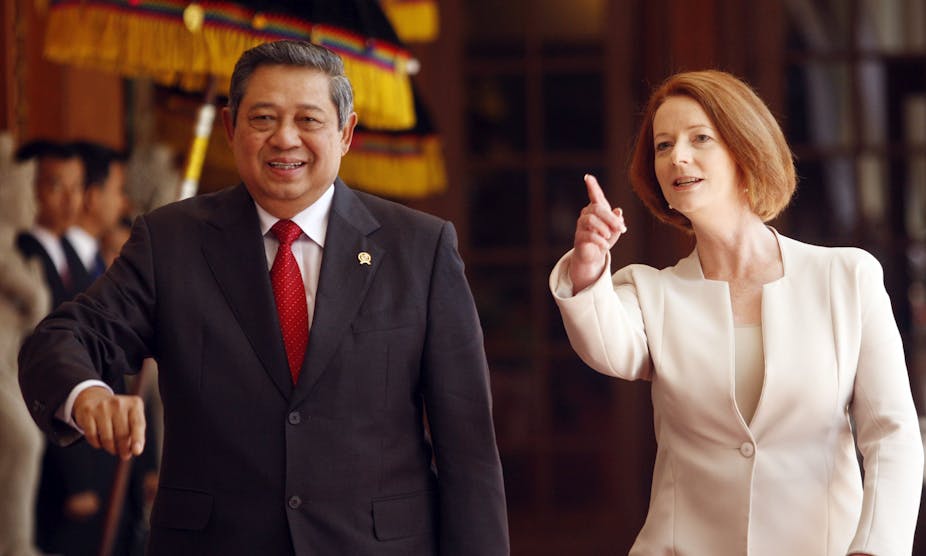Indonesia has announced that it will finally join the ASEAN-Australia-New Zealand Free Trade Agreement in January next year, making it the last of the 12 states involved to formally to implement the agreement.
Australian Trade Minister Craig Emerson welcomed the announcement, and foreshadowed that it would lead to a further strengthening of the economic relationship between Indonesia and Australia.
That relationship is at present stuck at a very low level.
The Indonesian economy is of growing regional and international significance. Indonesia is a member of the G20 and of the E7 group of emerging economies. It has the largest economy in ASEAN, is bigger than Australia’s economy, and growing at a rate in excess of 6.5% per year. Indonesia has weathered the global financial crisis remarkably well.
Yet trade between Australia and Indonesia remains stubbornly low.
In 2010, total two-way merchandise trade was worth just under $13 billion, the balance favouring Indonesia by about $1.3 billion. Each country represented between 2% and 3% of the other’s total import and export trade. Singapore, Malaysia and Thailand are all bigger trading partners for Australia than Indonesia. This has been the situation for some years.
Indonesia’s inclusion in the regional free trade pact is likely to make some contribution to deepening trade relations between the two countries. Yet its overall impact is likely to be limited. The problem is that the main barriers to bilateral trade are not tariffs.
Domestic political hurdles
In Indonesia, economic nationalism remains a robust political force. The Indonesian political commitment to free trade has never been particularly strong or broad-based.
Liberalism in economic policy, including aspects such as free trade and globalisation, is often equated with capitalism, which is in turn linked to exploitation and colonialism. Political leaders prepared to take a liberal line in economic policy do so at their own risk.
Sri Mulyani, one of Indonesia’s best finance ministers in recent times, was forced out of office in 2010 primarily because she was seen by her opponents as a supporter of liberal economics. She also pushed for honesty and transparency in the operations of the tax office. The October 2011 demotion of Mari Pangestu from Trade Minister to Minister for Tourism and Creative Economy has been attributed by some observers as result of her championing of liberal economic policies.
The inward-looking elements in the economy were further strengthened – and popular support for FTAs further reduced – by the Indonesian experience of the operations of the ASEAN-China free trade agreemnt, which came into full effect on January 1, 2010.
Businesspeople in Indonesia, as in Australia, have tended in recent years to have been dazzled by the appeal of China. But the impact of this agreement took much of the gloss off that appeal.
Indonesian imports from China have risen considerably since January 2010 – rises not matched by rises in Indonesian exports to China. To some observers, the agreement simply contributed further to the deindustrialisation of Indonesia, as small and medium-scale manufacturers were unable to compete with cheap Chinese imports.
There was much public disquiet about this development, and a hardening of attitudes against FTAs where the partner economy seemed demonstrably stronger.
Australia’s problems
The problems, of course, are not solely located in Indonesia. From the Indonesian viewpoint, Australia as a trade partner is small, not particularly serious about expanding trade relations, and often allowing politics to interfere with trade.
The latter could not have been better demonstrated than by Canberra’s banning of the live cattle trade with Indonesia earlier this year. This move was undertaken without any consultation with authorities in Indonesia – or, for that matter, with the Australian cattle producers. The ban was welcomed by Indonesia’s domestic cattle producers, and seized upon by those who are inclined to favour autarchy in economic matters.
Indonesia certainly has the potential to play an increasingly important role in regional and international economic affairs, and to become an important trading partner for Australia. But the primary barriers to such achievements lie domestically, not internationally. They include multiple levels of taxation, poor performance of public institutions, inadequate infrastructure and unreliable electricity supplies.
The Yudhoyono government is clearly aware of this fact, and has made some progress in addressing issues such as corruption and the weak legal system. But given the dispersed nature of power in Indonesia, it remains unclear whether enough political will exists to take forward-thinking decisions that might benefit the nation as a whole, but which would clearly work against the vested economic interests of a powerful minority.
In Australia, knee-jerk reactions to events in Indonesia, with little thought to the likely impact of those reactions on the commercial relationship, need to be avoided. This does not preclude direct action being taken when Australian interests are at stake. But it does mean discussing policy initiatives with the people likely to be impacted by them, before policy is announced.
What is clear is that this FTA, no matter how welcome in principle, will not be a major driver of the necessary changes. It is useful nonetheless, as contributing to a broadening of the policy dialogue with Indonesia, and in particular in shifting it away from its persistent emphasis on political and security matters.

